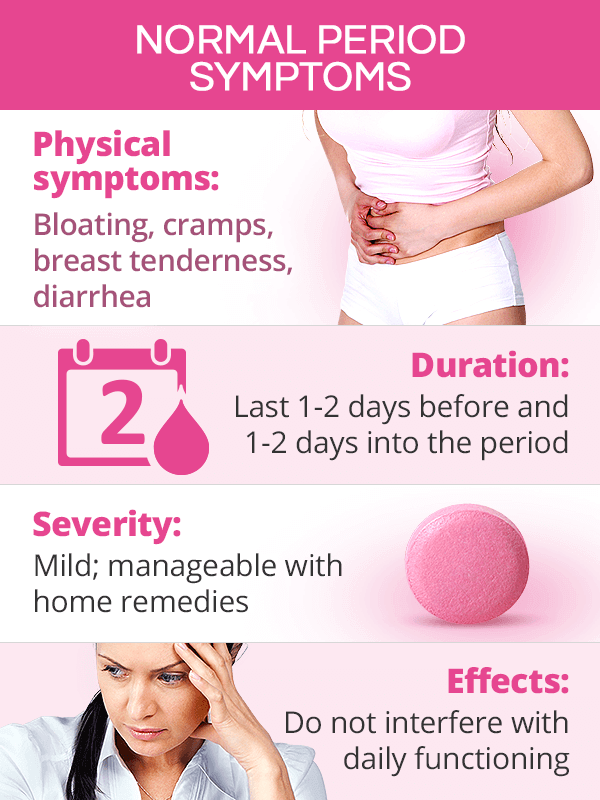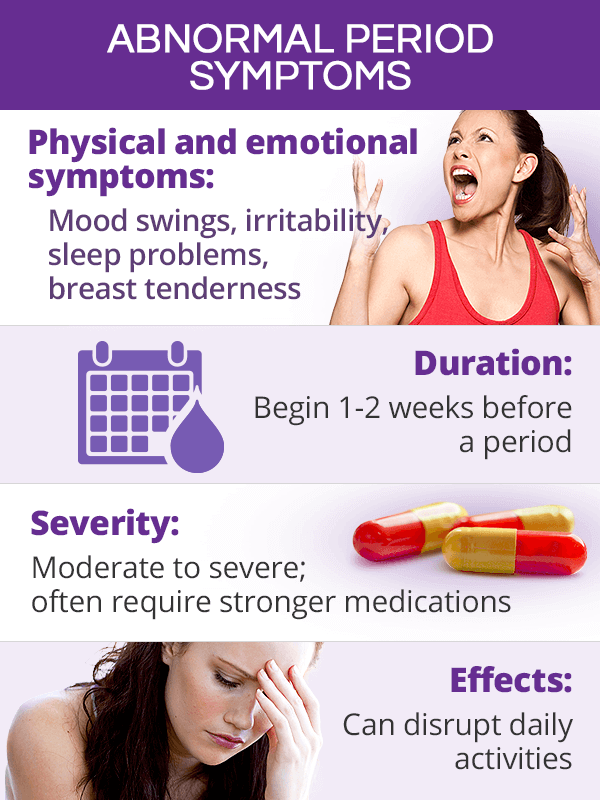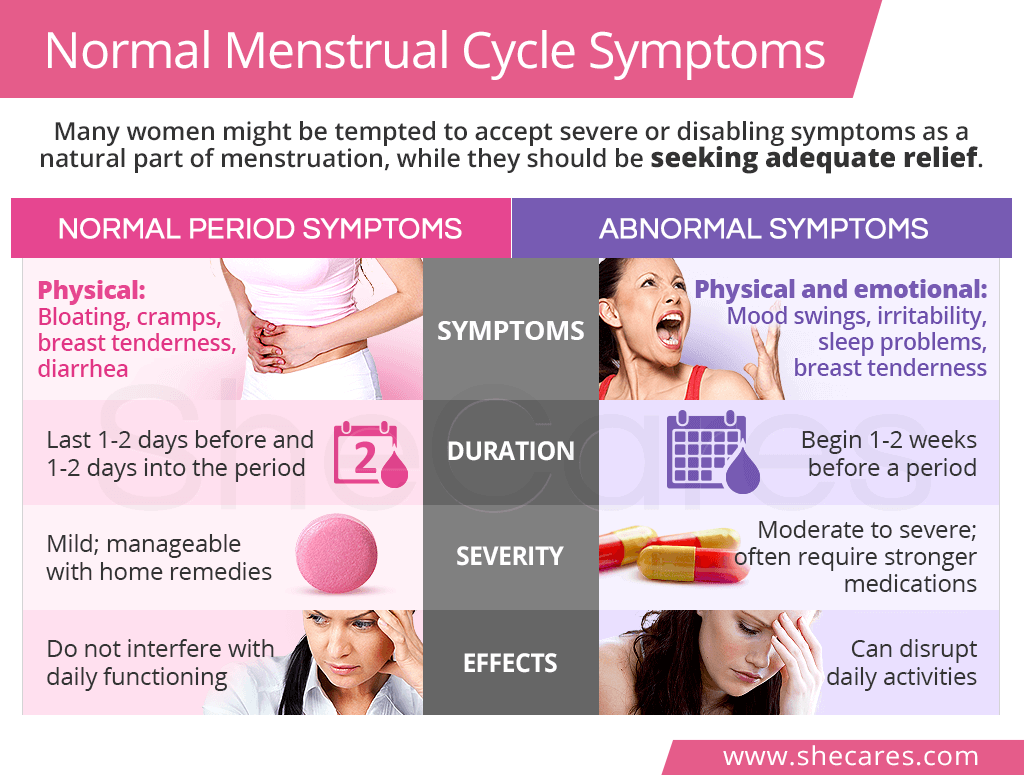What are Normal Period Symptoms?

Before diving into the list of normal period symptoms, it is essential to understand that what is considered “normal” to one woman can mean something else to another. In fact, monthly symptoms can change from cycle to cycle or throughout a woman's life.
Generally, normal menstrual cycle symptoms that are not indicative of menstrual disorders begin about one or two days before and last one or two days into the period.
Normal period symptoms mostly consist of mild physical discomforts and may include the following:1
- Bloating
- Diarrhea
- Breast tenderness
- Muscle aches
- Cramps
- Low energy
Causes of Normal Period Symptoms
Menstrual cycle symptoms women experience are believed to be caused by natural fluctuations of reproductive hormones, mainly estrogen and progesterone, which guide the cycles. These changes may affect some women more than others.
The main reason why hormones are the most probable culprit is that the normal period symptoms appear in a predictable pattern on a monthly basis around the bleeding days.
Normal Period Symptoms vs. Abnormal Symptoms

It is not unlikely for women to attribute any symptoms around their periods to premenstrual syndrome (PMS). While PMS is common, not all women suffer from it.
For period symptoms to be classified as PMS, they have to include emotional symptoms alongside the physical ones.2,3 They may consist of the following:
- Mood swings
- Irritability
- Difficulty concentrating
- Crying spells
- Social withdrawal
- Sadness
- Anxiety
- Sleep problems
- Food cravings
Additional important distinctions between normal and PMS symptoms are as follows:
Duration. As aforementioned, normal period symptoms are typically experienced a day or two before the start of the period and might last for a day or two once bleeding begins. PMS, on the other hand, can start a week or two before the beginning of the period.
Severity. While normal period symptoms are mild and may be managed with home remedies or over-the-counter pain relievers, PMS symptoms can be severe enough to require stronger medications or more advanced medical intervention.
Effects. Normal period symptoms should not affect a woman's daily functioning. PMS symptoms' severity, on the other hand, may disrupt her activities.
It is worth noting that when PMS symptoms become severe and include extreme psychological symptoms, like depression, anger, or apathy, they might indicate premenstrual dysphoric disorder (PMDD). It is a mental disorder that affects 3-8% of women.4
How to Relieve Normal Period Symptoms
Because normal period symptoms are generally minor and short-lived, they can be handled with wholesome lifestyle practices, natural remedies, and – alternatively - mild pain-relievers.
Natural remedies for periods might consist of loading up on foods rich in phytoestrogens, like flax, oats, sesame, or sunflower seeds; applying a heating pad; drinking oregano or ginger tea; giving aromatherapy a try; and practicing yoga or other exercises to release pain-relieving endorphins.
For stronger discomforts, a woman can consider taking nonsteroidal anti-inflammatory drugs (NSAIDs), like ibuprofen or naproxen.
Key Takeaways
Most women anticipate their monthly periods with significant apprehension, knowing all too well what is coming. In fact, most women assume that suffering from PMS symptoms is normal and somewhat expected. However, it is a common misconception that a period has to mean several miserable days taken out of one's life. The truth is that normal period symptoms are generally mild, short in duration, begin about a day or two before the start of a period, and do not interfere with a woman's daily activities. Menstrual cycle symptoms that are not indicative of a menstrual disorder can be easily relieved with wholesome lifestyle practices that focus on enriching diet with foods that promote hormonal balance, taking advantage of herbal remedies, and boosting endorphins with exercise. Knowing how to tell the difference between normal and abnormal period symptoms is key to optimal physical and mental well-being.
Sources
- Better Health Channel. (2017). Premenstrual syndrome (PMS). Retrieved November 14, 2019 from https://www.betterhealth.vic.gov.au/health/conditionsandtreatments/premenstrual-syndrome-pms
- Mayo Clinic. (2019). Menstrual cycle: What's normal, what's not. Retrieved November 14, 2019 from https://www.mayoclinic.org/healthy-lifestyle/womens-health/in-depth/menstrual-cycle/art-20047186
- NHS. (2019). Period problems. Retrieved November 14, 2019 from https://www.nhs.uk/conditions/periods/period-problems/
- Planned Parenthood. (n.d.). What's up with periods? Retrieved November 14, 2019 from https://www.plannedparenthood.org/learn/teens/puberty/whats-periods
Footnotes:
- The Society of Obstetricians and Gynaecologists of Canada. (n.d.). Normal Periods. Retrieved November 14, 2019 from https://www.yourperiod.ca/normal-periods/symptoms-of-menstruation/
- The Society of Obstetricians and Gynaecologists of Canada. (n.d.). Premenstrual Syndrome (PMS). Retrieved November 14, 2019 from https://www.yourperiod.ca/abnormal-pain-and-menstrual-bleeding/premenstrual-syndrome-pms/
- The American College of Obstetricians and Gynecologists. (2015). Premenstrual Syndrome (PMS). Retrieved November 14, 2019 from https://www.acog.org/Patients/FAQs/Premenstrual-Syndrome-PMS
- Casper. R. (2019). Patient education: Premenstrual syndrome (PMS) and premenstrual dysphoric disorder (PMDD). Retrieved November 21, 2019 from https://www.uptodate.com/contents/premenstrual-syndrome-pms-and-premenstrual-dysphoric-disorder-pmdd-beyond-the-basics


